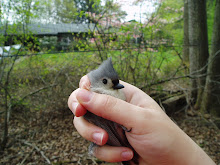It's always a nice thing when things I learned about in Animal Behavior class come back and may actually *gasp* apply to humans!
Boy or Girl? The Answer May Depend on Mom's Eating Habits
A little background: I can't find the reference right now, but a few years ago I read about a study that showed that mating success among male red deer (I think it was red deer) was directly correlated with how much they were fed as fawns. Only a fraction of the males in a population -- the biggest and most impressive -- will mate. However, since these males get all the mating opportunities, their mothers' genes are spread through many grand-fawns. This is good for grandma deer, since her fitness goes up every time her son reproduces.
On the other hoof, a wimpy son won't get to reproduce at all, effectively halting the spread of grandma deer's genes through the population. When times are tight, it makes more sense for a doe to produce a female fawn, because most females, even ones that didn't quite get enough to eat as babies, will reproduce at least once or twice in their lifetimes if they make it to adulthood. She might only get one or two grand-fawns, but this is a lot better than none at all.
At least, that was the hypothesis. But the researchers checked out the sex ratios of deer during good and bad years... and found exactly what they had predicted. Remember, deer are mammals too, and have the same kind of X-Y determination that we have. But females can control, to a certain extent, the sex of their offspring. That is pretty freakin' amazing, in and of itself.
And that's what they're referring to (at least partially, I think this has been found in other organisms as well) in the last line of this article. If it really does happen in humans, we wouldn't expect to see a radical skewing because we still have a genetic component and I would guess we don't want heavily skewed ratios. But we might expect to see a slight change in the ratios, which we do. Your body doesn't know that there is a lot of food in the world or that you want to be a size 6; all it knows is what you put into it. Skip breakfast? Times must be lean; better make a girl. Hearty breakfast? Excellent chances of producing a dominant male -- make it a boy! If I remember correctly, our closest relatives do have dominance hierarchies with top males getting most of the matings (although I think there are opportunities for other males to breed as well), so this isn't coming from out of left field, evolutionarily speaking.
I have to wonder what the implications of this study might be. Moms in China having big breakfasts to increase chances at boys? Women who want daughters skipping meals? What if parents want different sexes? Will fathers be able to say, "You're not eating enough, you're trying to deprive me of a son!" I don't know what the end result will be -- after all, it's a small study. There are still so many things that are unanswered. What is the mechanism for this kind of sex determination? As some comments on the post have pointed out, how does the father's health figure into this equation? It should be an interesting area of research for years to come.
Edit: OK, here's some more info. What I'm talking about is the Trivers-Willard hypothesis. I realize that Wikipedia isn't a great source, but not everyone will be able to access the original paper at JSTOR. (Also, they were talking about caribou, not red deer. My bad.) Oh, and the Wikipedia article also includes a citation about primates, although they're macaques and not great apes. There's also this article at BioOne titled "Maternal Diet and Other Factors Affecting Offspring Sex Ratio: A Review." If you want to try to find it through your own institution, here's the rest of the info: Rosenfeld & Roberts, Biology of Reproduction, Volume 71, Issue 4 (October 2004).
PS [dang, I wish I had a timestamp]: EVEN MORE info from the Science website, but this should be accessible to everyone for the next few weeks. But they mention Trivers-Willard as well, so I was on the right track before and therefore I am not crazy, I am just a bio geek. Yay biology!
Subscribe to:
Post Comments (Atom)



No comments:
Post a Comment